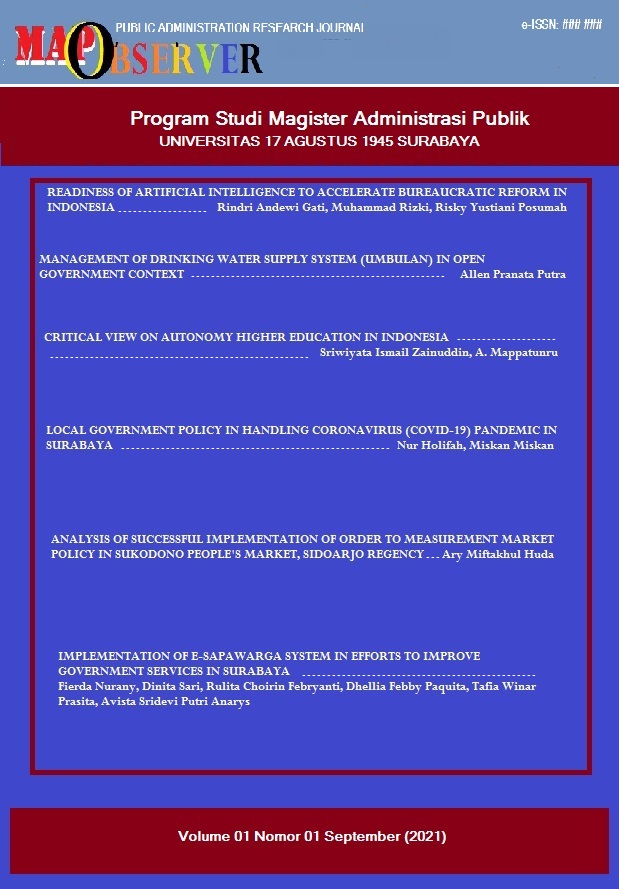READINESS OF ARTIFICIAL INTELLIGENCE TO ACCELERATE BUREAUCRATIC REFORM IN INDONESIA
DOI:
https://doi.org/10.30996/mapo.v1i1.5606Keywords:
artificial intelligence, bureaucratic reform, IndonesiaAbstract
The national use of AI in the government sector is necessary to achieve effectiveness and efficiency in supporting bureaucratic reform and policy decision making in order to implement good governance. The research uses qualitative descriptive methods by reviewing previous research, and reviewing policies related to the use of AI in government and bureaucratic reform. The results show that in terms of governance, AI systems do not yet have specific laws governing and ensuring the security and protection of citizen data and the use of algorithms against the misuse of electronic transactions. In terms of governance, AI development is needed as an effort to maintain public trust and government legitimacy. In terms of infrastructure Indonesia is still constrained by the creation of data that is very difficult and does not allow for reuse. In terms of skills and education, the digital skills of workers in Indonesia are still middle level. In terms of government and public services, Indonesia still has to continue to increase the availability of public services digitally. In order to improve the management of AI Indonesia builds artificial intelligence industry research and innovation collaboration (KORI-KA), a quadruple-helix approach between government, industry, academia and the community. At a strategic level, AI management is conducted with policy, accountability, and accountability approaches. At the operational level, cybersecurity against data includes infrastructure security and the use of anonymous data methods to keep data owners unidentified.
Downloads
References
Nilsson, Nils J. 1998. Artificial Intelligence: A New Synthesis Artificial Intelligence: A New Synthesis. San Fransisco: Morgan Kaufmann Publishers.
Olaf J. Groth, Mark Nitzberg, Dan Zehr. 2019. Comparison of National Strategies to Promote Artificial Intelligence Part 2. ed. Konrad-Adenauer-Stiftung e. V. Berkeley: Cambrian. https://www.kas.de/documents/252038/4521287/Comparison+of+National+Strategies+to+Promote+Artificial+Intelligence+Part+2.pdf/4c6f3a0d-beaa-09f3-1db4-c66467739653?version=1.1&t=1560500520623.
Poole, D. L., Alan Mackworth, and R. G. Goebel. 1998. “Computational Intelligence and Knowledge.” Computational Intelligence: A Logical Approach.
Portal Informasi Indonesia. 2020. “Ketika Indeks E-Government Indonesia Naik 19 Peringkat.” https://indonesia.go.id/ragam/komoditas/ekonomi/ketika-indeks-e-government-indonesia-naik-19-peringkat (July 13, 2020).
Portal SPBE Nasional. 2020. “Rencana Strategis SPBE.” Portal SPBE Nasional. http://spbe.go.id/renstra.
Ririh, Kirana Rukmayuninda et al. 2020. “Studi Komparasi Dan Analisis Swot Pada Implementasi Kecerdasan Buatan ( Artificial Intelligence ) Di Indonesia.” J@ti Undip: Jurnal Teknik Industri 15(2): 122–33.
Russell, Stuart, and Peter Norvig. 2010. Pearson Artificial Intelligence A Modern Approach Third Edition.
Schwab, Klaus. 2019. “Global Competitiveness Report 2019 | World Economic Forum.” World Economic Forum.
Slyusar, Vadym. 2019. Artificial Intelligence as the Basis of Future Control Networks.
Tinholt, D., et al. 2017. “Unleashing the Potential of Artificial Intelligence in the Public Sector.” Capgemini.
UNDP. 1999. “Decentralization: A Sampling of Definitions.” October 134(October).
United Nations. 2020. E-Government Survey 2020. New York. https://publicadministration.un.org/egovkb/Portals/egovkb/Documents/un/2020-Survey/2020 UN E-Government Survey (Full Report).pdf.
United Nations Institute for Disarmament Research. 2020. Indonesia - Cyber Policy Portal. https://cyberpolicyportal.org/en/state-pdf-export/eyJjb3VudHJ5X2dyb3VwX2lkIjoiNjQifQ.
World Bank. World Governance Indicators. https://info.worldbank.org/governance/wgi/Home/Reports.
World Economic Forum. 2016. “Global Information Technology Report 2016.” http://reports.weforum.org/global-information-technology-report-2016/economies/?doing_wp_cron=1595683661.7548999786376953125000#indexId=NRI&economy=IDN (July 1, 2020).
Downloads
Published
How to Cite
Issue
Section
License
-
The MAP Observer journal allows authors to retain the copyright of their papers without limitation. Authors may grant publishers non-exclusive publishing rights to publish articles. Granting first publishing rights to publishers also qualifies as unlimited copyright (because there are no restrictions imposed by publishers on author copyright).
-
Formal legal provisions for access to digital articles from these electronic journals are subject to the terms of the Creative Commons Attribution-ShareAlike (CC BY-SA) license, which means MAPO Observer Journal has the right to store, change formats, maintain in a database, maintain and publish articles without asking. permission from the Author as long as the Author's name is the owner of the Copyright.
-
Printed manuscripts and electronic publications are open access for educational, research and library purposes. Apart from these purposes, the editorial board is not responsible for violations of copyright law.









